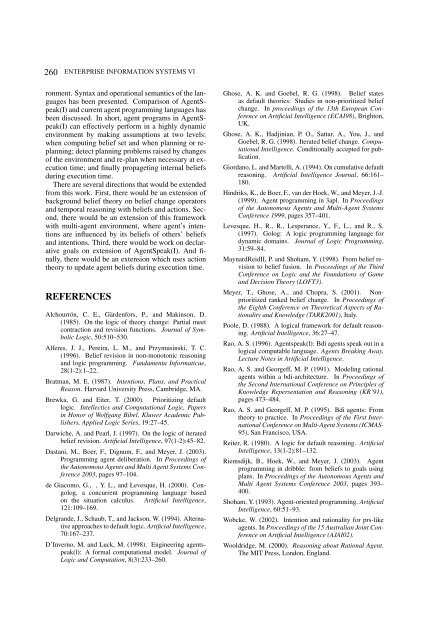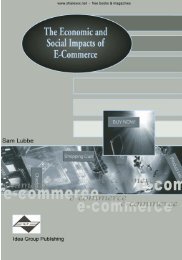Back Room Front Room 2
Back Room Front Room 2
Back Room Front Room 2
Create successful ePaper yourself
Turn your PDF publications into a flip-book with our unique Google optimized e-Paper software.
260 ENTERPRISE INFORMATION SYSTEMS VI<br />
ronment. Syntax and operational semantics of the languages<br />
has been presented. Comparison of AgentSpeak(I)<br />
and current agent programming languages has<br />
been discussed. In short, agent programs in AgentSpeak(I)<br />
can effectively perform in a highly dynamic<br />
environment by making assumptions at two levels:<br />
when computing belief set and when planning or replanning;<br />
detect planning problems raised by changes<br />
of the environment and re-plan when necessary at execution<br />
time; and finally propageting internal beliefs<br />
during execution time.<br />
There are several directions that would be extended<br />
from this work. First, there would be an extension of<br />
background belief theory on belief change operators<br />
and temporal reasoning with beliefs and actions. Second,<br />
there would be an extension of this framework<br />
with multi-agent environment, where agent’s intentions<br />
are influenced by its beliefs of others’ beliefs<br />
and intentions. Third, there would be work on declarative<br />
goals on extension of AgentSpeak(I). And finally,<br />
there would be an extension which uses action<br />
theory to update agent beliefs during execution time.<br />
REFERENCES<br />
Alchourrón, C. E., Gärdenfors, P., and Makinson, D.<br />
(1985). On the logic of theory change: Partial meet<br />
contraction and revision functions. Journal of Symbolic<br />
Logic, 50:510–530.<br />
Alferes, J. J., Pereira, L. M., and Przymusinski, T. C.<br />
(1996). Belief revision in non-monotonic reasoning<br />
and logic programming. Fundamenta Informaticae,<br />
28(1-2):1–22.<br />
Bratman, M. E. (1987). Intentions, Plans, and Practical<br />
Reason. Harvard University Press, Cambridge, MA.<br />
Brewka, G. and Eiter, T. (2000). Prioritizing default<br />
logic. Intellectics and Computational Logic, Papers<br />
in Honor of Wolfgang Bibel, Kluwer Academic Publishers,<br />
Applied Logic Series, 19:27–45.<br />
Darwiche, A. and Pearl, J. (1997). On the logic of iterated<br />
belief revision. Artificial Intelligence, 97(1-2):45–82.<br />
Dastani, M., Boer, F., Dignum, F., and Meyer, J. (2003).<br />
Programming agent deliberation. In Proceedings of<br />
the Autonomous Agents and Multi Agent Systems Conference<br />
2003, pages 97–104.<br />
de Giacomo, G., , Y. L., and Levesque, H. (2000). Congolog,<br />
a concurrent programming language based<br />
on the situation calculus. Artificial Intelligence,<br />
121:109–169.<br />
Delgrande, J., Schaub, T., and Jackson, W. (1994). Alternative<br />
approaches to default logic. Artificial Intelligence,<br />
70:167–237.<br />
D’Inverno, M. and Luck, M. (1998). Engineering agentspeak(l):<br />
A formal computational model. Journal of<br />
Logic and Computation, 8(3):233–260.<br />
Ghose, A. K. and Goebel, R. G. (1998). Belief states<br />
as default theories: Studies in non-prioritized belief<br />
change. In proceedings of the 13th European Conference<br />
on Artificial Intelligence (ECAI98), Brighton,<br />
UK.<br />
Ghose, A. K., Hadjinian, P. O., Sattar, A., You, J., and<br />
Goebel, R. G. (1998). Iterated belief change. Computational<br />
Intelligence. Conditionally accepted for publication.<br />
Giordano, L. and Martelli, A. (1994). On cumulative default<br />
reasoning. Artificial Intelligence Journal, 66:161–<br />
180.<br />
Hindriks, K., de Boer, F., van der Hoek, W., and Meyer, J.-J.<br />
(1999). Agent programming in 3apl. In Proceedings<br />
of the Autonomous Agents and Multi-Agent Systems<br />
Conference 1999, pages 357–401.<br />
Levesque, H., R., R., Lesperance, Y., F., L., and R., S.<br />
(1997). Golog: A logic programming language for<br />
dynamic domains. Journal of Logic Programming,<br />
31:59–84.<br />
MaynardReidII, P. and Shoham, Y. (1998). From belief revision<br />
to belief fusion. In Proceedings of the Third<br />
Conference on Logic and the Foundations of Game<br />
and Decision Theory (LOFT3).<br />
Meyer, T., Ghose, A., and Chopra, S. (2001). Nonprioritized<br />
ranked belief change. In Proceedings of<br />
the Eighth Conference on Theoretical Aspects of Rationality<br />
and Knowledge (TARK2001), Italy.<br />
Poole, D. (1988). A logical framework for default reasoning.<br />
Artificial Intelligence, 36:27–47.<br />
Rao, A. S. (1996). Agentspeak(l): Bdi agents speak out in a<br />
logical computable language. Agents Breaking Away,<br />
Lecture Notes in Artificial Intelligence.<br />
Rao, A. S. and Georgeff, M. P. (1991). Modeling rational<br />
agents within a bdi-architecture. In Proceedings of<br />
the Second International Conference on Principles of<br />
Knowledge Repersentation and Reasoning (KR’91),<br />
pages 473–484.<br />
Rao, A. S. and Georgeff, M. P. (1995). Bdi agents: From<br />
theory to practice. In Proceedings of the First International<br />
Conference on Multi-Agent Systems (ICMAS-<br />
95), San Francisco, USA.<br />
Reiter, R. (1980). A logic for default reasoning. Artificial<br />
Intelligence, 13(1-2):81–132.<br />
Riemsdijk, B., Hoek, W., and Meyer, J. (2003). Agent<br />
programming in dribble: from beliefs to goals using<br />
plans. In Proceedings of the Autonomous Agents and<br />
Multi Agent Systems Conference 2003, pages 393–<br />
400.<br />
Shoham, Y. (1993). Agent-oriented programming. Artificial<br />
Intelligence, 60:51–93.<br />
Wobcke, W. (2002). Intention and rationality for prs-like<br />
agents. In Proceedings of the 15 Australian Joint Conference<br />
on Artificial Intelligence (AJAI02).<br />
Wooldridge, M. (2000). Reasoning about Rational Agent.<br />
The MIT Press, London, England.









